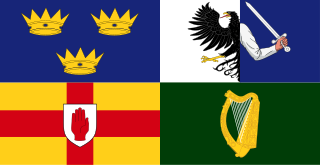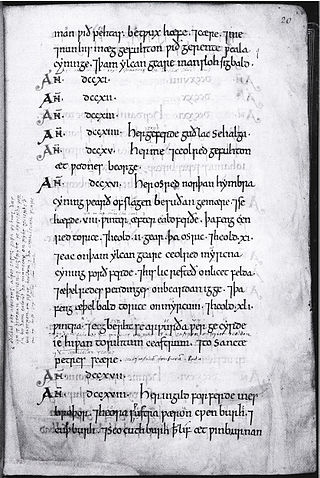Related Research Articles
Old English literature refers to poetry and prose written in Old English in early medieval England, from the 7th century to the decades after the Norman Conquest of 1066, a period often termed Anglo-Saxon England. The 7th-century work Cædmon's Hymn is often considered as the oldest surviving poem in English, as it appears in an 8th-century copy of Bede's text, the Ecclesiastical History of the English People. Poetry written in the mid 12th century represents some of the latest post-Norman examples of Old English. Adherence to the grammatical rules of Old English is largely inconsistent in 12th-century work, and by the 13th century the grammar and syntax of Old English had almost completely deteriorated, giving way to the much larger Middle English corpus of literature.
Old English, or Anglo-Saxon, was the earliest recorded form of the English language, spoken in England and southern and eastern Scotland in the early Middle Ages. It developed from the languages brought to Great Britain by Anglo-Saxon settlers in the mid-5th century, and the first Old English literary works date from the mid-7th century. After the Norman Conquest of 1066, English was replaced for several centuries by Anglo-Norman as the language of the upper classes. This is regarded as marking the end of the Old English era, since during the subsequent period the English language was heavily influenced by Anglo-Norman, developing into what is now known as Middle English in England and Early Scots in Scotland.
The Old English Bible translations are the partial translations of the Bible prepared in medieval England into the Old English language. The translations are from Latin texts, not the original languages.
Middle English Bible translations covers the age of Middle English, beginning after the Norman Conquest (1066) and ending about 1500.

The Textus Roffensis, fully titled the Textus de Ecclesia Roffensi per Ernulphum episcopum and sometimes also known as the Annals of Rochester, is a mediaeval manuscript that consists of two separate works written between 1122 and 1124. It is catalogued as "Rochester Cathedral Library, MS A.3.5" and as of 2023 is currently on display in a new exhibition at Rochester Cathedral in Rochester, Kent. It is thought that the main text of both manuscripts was written by a single scribe, although the English glosses to the two Latin entries were made by a second hand. The annotations might indicate that the manuscript was consulted in some post-Conquest trials. However, the glosses are very sparse and just clarify a few uncertain terms. For example, the entry on f. 67r merely explains that the triplex iudiciu(m) is called in English, ofraceth ordel.
West Saxon is the term applied to the two different dialects Early West Saxon and Late West Saxon with West Saxon being one of the four distinct regional dialects of Old English. The three others were Kentish, Mercian and Northumbrian. West Saxon was the language of the kingdom of Wessex, and was the basis for successive widely used literary forms of Old English: the Early West Saxon of Alfred the Great's time, and the Late West Saxon of the late 10th and 11th centuries. Due to the Saxons' establishment as a politically dominant force in the Old English period, the West Saxon dialects became the strongest dialects in Old English manuscript writing.

The Winchester Troper refers to two eleventh-century manuscripts of liturgical plainchant and two-voice polyphony copied and used in the Old Minster at Winchester Cathedral in Hampshire, England. The manuscripts are now held at Cambridge, Corpus Christi College 473 and Oxford, Bodleian Library Bodley 775 . The term "Winchester Troper" is best understood as the repertory of music contained in the two manuscripts. Both manuscripts contain a variety of liturgical genres, including Proper and Ordinary chants for both the Mass and the Divine Office. Many of the chants can also be found in other English and Northern French tropers, graduals, and antiphoners. However, some chants are unique to Winchester, including those for local saints such as St. Æthelwold and St. Swithun, who were influential Bishops of Winchester in the previous centuries. Corpus 473 contains the most significant and largest surviving collection of eleventh-century organum. This polyphonic repertoire is unique to that manuscript.

The Blickling homilies are a collection of anonymous homilies from Anglo-Saxon England. They are written in Old English, and were written down at some point before the end of the tenth century, making them one of the oldest collections of sermons to survive from medieval England, the other main witness being the Vercelli Book. Their name derives from Blickling Hall in Norfolk, which once housed them; the manuscript is now at Princeton, Scheide Library, MS 71.

The Parker Library is a library within Corpus Christi College, Cambridge which contains rare books and manuscripts. It is known throughout the world due to its invaluable collection of over 600 manuscripts, particularly medieval texts, the majority of which were bequeathed to the college by Archbishop of Canterbury Matthew Parker, a former Master of Corpus Christi College.

The Stowe Psalter is a psalter from the "2nd or 3rd quarter of the 11th century", at the end of Anglo-Saxon art. The text includes the Gallican version of the Psalms, followed by the Canticles with an interlinear Old English gloss.
Abraham Wheelock was an English linguist. He was the first Cambridge professor of Arabic.

A fetch is a supernatural double or an apparition of a living person. The sighting of a fetch is regarded as an omen, usually for impending death.

John Joscelyn, also John Jocelyn or John Joscelin, (1529–1603) was an English clergyman and antiquarian as well as secretary to Matthew Parker, an Archbishop of Canterbury during the reign of Queen Elizabeth I of England. Joscelyn was involved in Parker's attempts to secure and publish medieval manuscripts on church history, and was one of the first scholars of the Old English (Anglo-Saxon) language. He also studied the early law codes of England. His Old English dictionary, although not published during his lifetime, contributed greatly to the study of that language. Many of his manuscripts and papers eventually became part of the collections of Cambridge University, Oxford University, or the British Library.

Frithegod, was a poet and clergyman in the mid 10th-century who served Oda of Canterbury, an Archbishop of Canterbury. As a non-native of England, he came to Canterbury and entered Oda's service as a teacher and scholar. After Oda's death he likely returned to the continent. His most influential writing was a poem on the life of Wilfrid, an 8th-century bishop and saint, named Breviloquium Vitae Wilfridi. Several manuscripts of this poem survive, as well as a few other of Frithegod's poems. He was also known for the complexity of his writings, with one historian even calling them "damnably difficult".
Michael Lapidge, FBA is a scholar in the field of Medieval Latin literature, particularly that composed in Anglo-Saxon England during the period 600–1100 AD; he is an emeritus Fellow of Clare College, Cambridge, a Fellow of the British Academy, and winner of the 2009 Sir Israel Gollancz Prize.

The Cleopatra Glossaries are three Latin-Old English glossaries all found in the manuscript Cotton Cleopatra A.iii. The glossaries constitute important evidence for Old English vocabulary, as well as for learning and scholarship in early medieval England generally. The manuscript was probably written at St Augustine's, Canterbury, and has generally been dated to the mid-tenth century, though recent work suggests the 930s specifically.
The Leiden Glossary is a glossary contained in a manuscript in Leiden University Library in the Netherlands, Voss. Lat. Q. 69. The lemmata (headwords) come from "a range of biblical, grammatical, and patristic texts". It is based on an Anglo-Saxon exemplar, and was prepared c. 800 in the Abbey of Saint Gall in modern-day Switzerland.

Blickling Psalter, also known as Lothian Psalter, is an 8th-century Insular illuminated manuscript containing a Roman Psalter with two additional sets of Old English glosses.

The Épinal-Erfurt glossary is a glossary of Old English. It survives in two manuscripts. It has been described as "the earliest body of written English", and is thought to have been compiled at Malmesbury for Aldhelm.
The Harley Glossary is an Anglo-Saxon glossary, mostly providing glosses on Latin words.
References
- ↑ Kuhn, Sherman M. (1939). "The Dialect of the Corpus Glossary". PMLA. 54 (1): 1–19. doi:10.2307/458625. JSTOR 458625.
- ↑ Hartmann, R.R.K. (2003). Lexicography: Dictionaries, compilers, critics, and users. Routledge. p. 48. ISBN 9780415253666 . Retrieved 2017-01-08.
- ↑ Lindsay, W.M. (2014). The Corpus Glossary. Cambridge University Press. ISBN 9781107637818 . Retrieved 2017-01-08.
- ↑ Phillip Pulsiano, ‘Prayers, Glosses and Glossaries’, in A Companion to Anglo-Saxon Literature, ed. by Phillip Pulsiano and Elaine Treharne (Oxford, 2001), pp. 209–30 (p. 218).
- ↑ Hessels, J.H. (2011). An Eighth-Century Latin-Anglo-Saxon Glossary Preserved in the Library of Corpus Christi College, Cambridge. Cambridge University Press. ISBN 9781108029087 . Retrieved 2017-01-08.